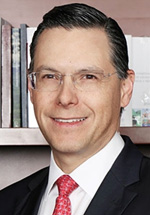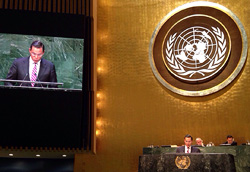DA alumnus Max Alberto Diener Sala on his career since graduating from DLG 28 in 1993
DA: You graduated from the DA 25 years ago. Where are you working now and what are your responsibilities?
responsibilities?
Max Alberto Diener Sala: Currently I serve as Fiscal Attorney (2015-2018) – [an] Undersecretary position – in the Ministry of Finance of the Mexican Federal Government.
My role is to serve as the general attorney of the finance sector, falling within the scope of my competences to: represent the fiscal interests of the Federation before the courts; provide legal advice for any bill or reform in tax or financial matters; participate in the negotiations of the annual economic packages presented before the Congress of the Union – I have had the opportunity to be present in 19 negotiations, that is, for 19 years –, which contain the tax and budgetary rules that are indispensable both for the healthy functioning of the Mexican government and the national economy; I am also empowered to investigate and report the crimes in tax matters committed in the finance sector, such as illegal schemes used to avoid paying taxes.
Moreover, I must represent the Ministry of Finance before international organizations and forums, such as the Financial Action Task Force (FATF), the Organization for Economic Co-operation and Development (OECD), the World Bank (WB), and the Inter-American Development Bank (IDB); additionally, I take part in the negotiation of international treaties, such as those related to double taxation or the implementation of measures against Base Erosion and Profit Shifting (BEPS).
How did you get where you are now? Please give us some insight into your career path.
 There are two things that allowed me to become Fiscal Attorney: quality education and professional experience.
There are two things that allowed me to become Fiscal Attorney: quality education and professional experience.
From 1986 to 1991, I studied and got a Law Degree at a prestigious international university, the Universidad Nacional Autónoma de México – National Autonomous University of Mexico (UNAM). Subsequently, during 1990 and 1991, I did postgraduate studies at the Instituto Tecnológico Autónomo de México – Autonomous Technological Institute of Mexico (ITAM), which is also recognized as an educational institution of excellence. Afterwards, from 1991 to 1993, I had the great opportunity to study at the Diplomatic Academy of Vienna (28. Lehrgang) with a focus on international finance.
Regarding my professional experience, I have devoted more than 20 years to public service highlighting the following positions:
+ Ministry of Social Development, Director (1993-1995): I negotiated the granting of credits to Mexico by the World Bank, in the framework of the North American Free Trade Agreement.
+ Ministry of Finance, Deputy General Director and General Director (1995-2009): I devoted myself mainly to legal analysis in budgetary matters, as well as to the negotiation of the economic packages that the Congress of the Union must approve annually.
+ Ministry of Finance, Deputy Fiscal Attorney (2010-2011): I focused on analysis, legal advice and negotiation of tax, financial and budgetary laws, as well as economic packages and international regulation on matters such as double taxation and BEPS.
+ Ministry of the Interior, Undersecretary (2012): In addition to participating in government issues and promotion of human rights, I was in charge of analyzing several legal reforms, as well as the important mission to represent Mexico before human rights international forums, such as the United Nation Human Rights Commission, the Inter-American Commission on Human Rights, and the Inter-American Court of Human Rights.
+ Ministry of Foreign Affairs, Legal Advisor of Mexico (2013-2015): I represented Mexico’s legal interests before several international forums, negotiating matters such as: international treaties regarding sea law beyond national jurisdictions, in the framework of the United National General Assembly (UNGA); underwater mining; the crisis in Mexico’s south border with Guatemala; the sea boundary in the Gulf of Mexico between the United States, Cuba, and Mexico; and the Arms Trade Treaty.
During these years, I have also taught administrative law, international law and foreign trade law at institutions such as the UNAM, the Centre for Research and Teaching in Economics (CIDE), the ITAM, the Colegio de México – College of Mexico (COLMEX).
Which skills are the most important that you developed during your studies at the Academy?
Upon my admission to the Diplomatic Academy of Vienna, I had completed my bachelor studies in law at UNAM, as well as completed a diploma course in political sciences at ITAM.
During my stay in Austria I discovered that one of the great tools I had, apart from my college studies, is that I was able to speak four languages – Spanish, English, German, and French –, which greatly facilitated my studies, in addition to offering me the opportunity to interact more closely with other students of the Academy.
I cannot stop pondering the before and after of having studied in Austria. I must admit that a lot of my achievements are thanks to the tools that were provided to me at the Academy, especially regarding the exercise of diplomacy in the many international forums in which I have had the privilege of representing Mexico’s interests.
Which career advice would you give current students for their future?
I assume that for being students at the Diplomatic Academy of Vienna, you are sensitive to the importance of international issues and globalization.
When I was in your place as a student at the Academy – a few years ago – I remember that the integration of Austria into the European Union was being developed, as well as the war in the former Yugoslavia. Can you imagine what was happening and what was being thought in Austria, in Europe or throughout the world at that time?
If in the nineties we already had light on the necessity and inevitability that globalization was, nowadays it is indisputable that globalization is more than an ideological position; it is the broader understanding that we are a global community that shares a market, is interlaced socially, culturally and ideologically.
Although phenomena such as Brexit and the anti-system movement must motivate us to think about the necessity to review and correct what is not working, we must not lose sight of the fact that a better world cannot be achieved by building walls between nations, walls that seek to justify themselves with traditionalisms or nativism.
We must aspire to be a true global community that rests on unity and mutual help. We must be aware that a country cannot, and should not, disassociate itself from the rest of the world, since this would imply assuming itself as a nation that lives in the utopia of self-sufficiency. So I invite you to have an open mind, not only to what we want as citizens, but to what we aspire as inhabitants of our world.
Is there anything you would like to add?
Make the most of the opportunity you have by being at the Diplomatic Academy of Vienna, be open and give yourselves the opportunity to get along and interact with all students.
Keep in mind that the ultimate tool is the human factor, so do not miss this invaluable experience of meeting wonderful people, because doing so will give you the sensitivity you need to reach agreements in the diplomatic exercise.
Human relations, the complementation of societies and the solidarity of nations is what will save the current world amid the great dilemmas of globalization.
[From ClubDA News 1/2018]